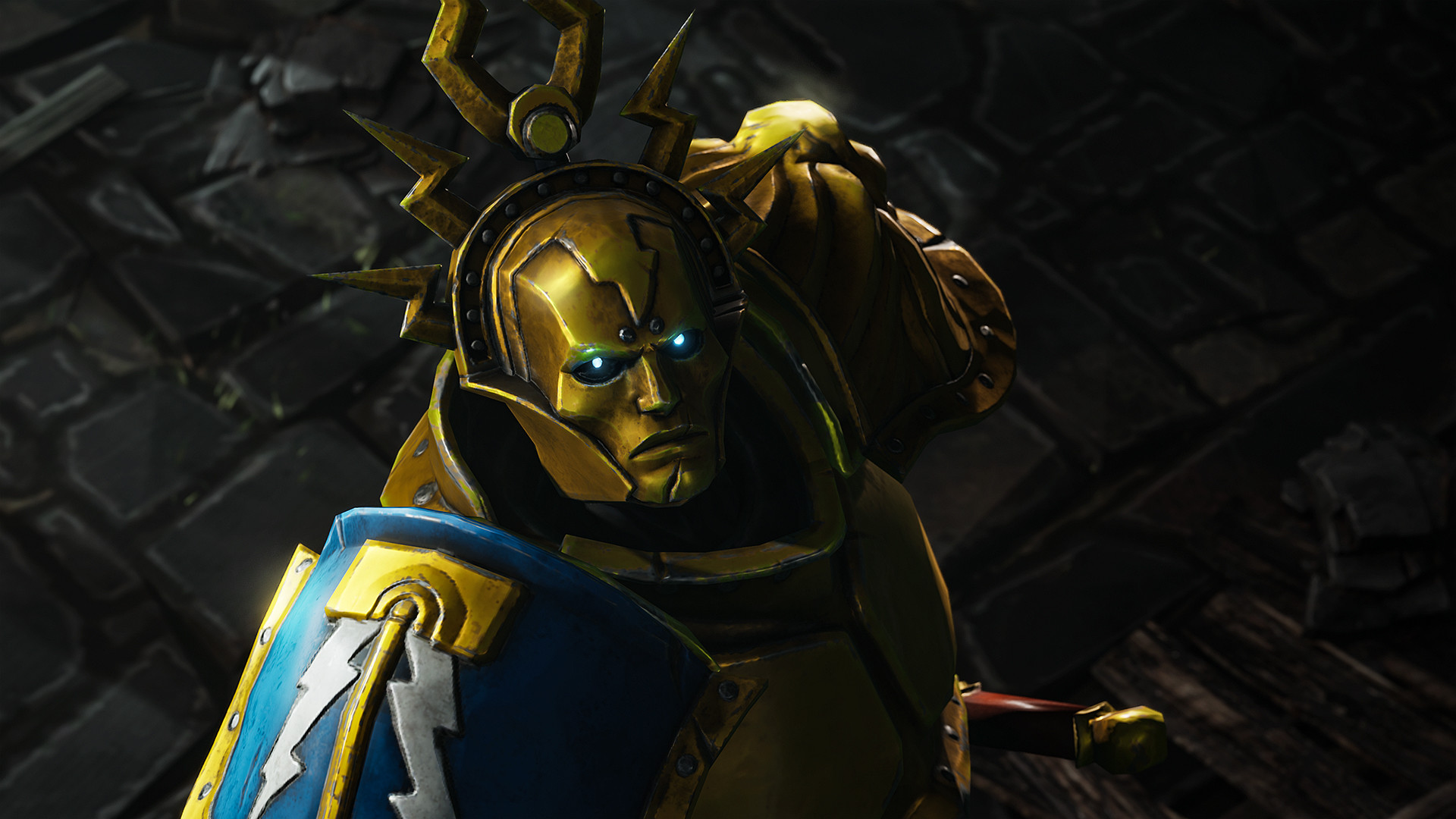Our Verdict
A straightforward tactics game buried beneath a impassable mountain of roguelike metagame.
PC Gamer's got your back
What is it? A turn-based tactics game set in the fantasy world of Warhammer: Age of Sigmar
Expect to pay $40/£30
Developer Gasket Games
Publisher Focus Home Interactive
Reviewed on Ryzen 7 5800H, Nvidia GeForce 3070 (mobile), 16GB RAM
Multiplayer? Yes, 1v1
Link Official site
With Warhammer games having the hit ratio of a blunderbuss shooting a target at fifty feet, I should really be immune to its allure by now. But by Sigmar's steely scrotum, something about its world just gets me. I'll internet-binge whichever faction I command in Total War: Warhammer, and amidst the onslaughts of Vermintide I'll tell my teammates to shut up and wait a second as I soak up the banter between the heroes in my search for little lore tidbits.
So when asked to review Age of Sigmar: Storm Ground—the first Warhammer game set in the newish titular setting—I felt that familiar frisson stir within me. Sadly, like so much Warhammer spawn, its lore and fine writing flatter a flawed game—a clumsy attempt to combine tactical turn-based combat with a bewildering roguelike metagame.
You start each battle with a single hero unit. As you amass 'Power' over the turns you can call in subsequent units using cards that you earn by completing missions and looting chests in battle. The card system is an interesting idea, keeping battles unpredictable and disruptive (particularly in multiplayer) as your opponent will never quite know what unit you'll throw in next—and where.
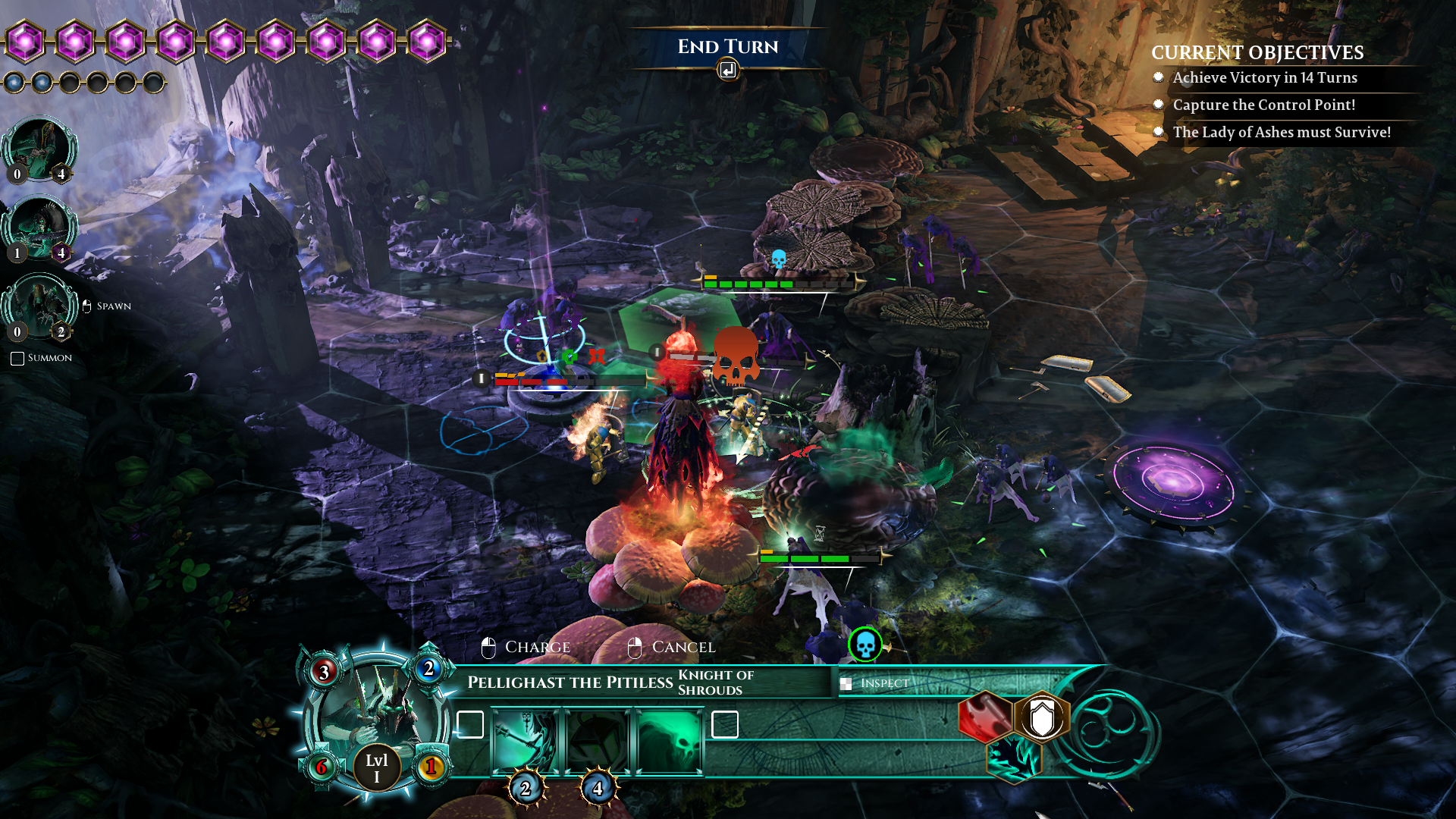
Cards not only take the form of units, but of weapons and skills that can mix up the strategic use for your troops; you can replace classic sword-and-shield combos with two-handed hammers with lightning damage, for example, or speed up a slow unit by giving it a skill that grants +1 movement when damaged. Your campaign progress resets when you die, but unlocked weapons and skills stay attached to your units, and you get to pick two of them to join you on a new run.
The three factions cater to different playstyles. You have your straightforward Stormcast Eternals—humans wielding heavy armour and divine judgement. The Nighthaunt are a spectral faction of low-armour, fast-moving swarmers, whose hero can throw down healing wisps each turn to heal allies and summon pyres all over the battlefield that act as spawn points. hen there are the Maggotkin. Ahhh my sweet Maggotkin, where have you been all my life? Probably partying in whatever brown bubble bath awaits at the far end of our society's sewage system, given their predilection for all things putrid.
I love their disposition, from their hero Ichorian's chirpy dum-de-dumming as he moves between hexes, to the way the tiny Nurglings dance around in a state of permanent ecstasy (upon further reading, it turns out that the Plague God they lovingly called 'Grandfather' is actually a pretty decent bloke, treating his worshippers to all the rot and disease they desire). Their playstyle is based around plopping puddles of green corruption around the battlefield which heal allies, damage enemies and let you spawn units.
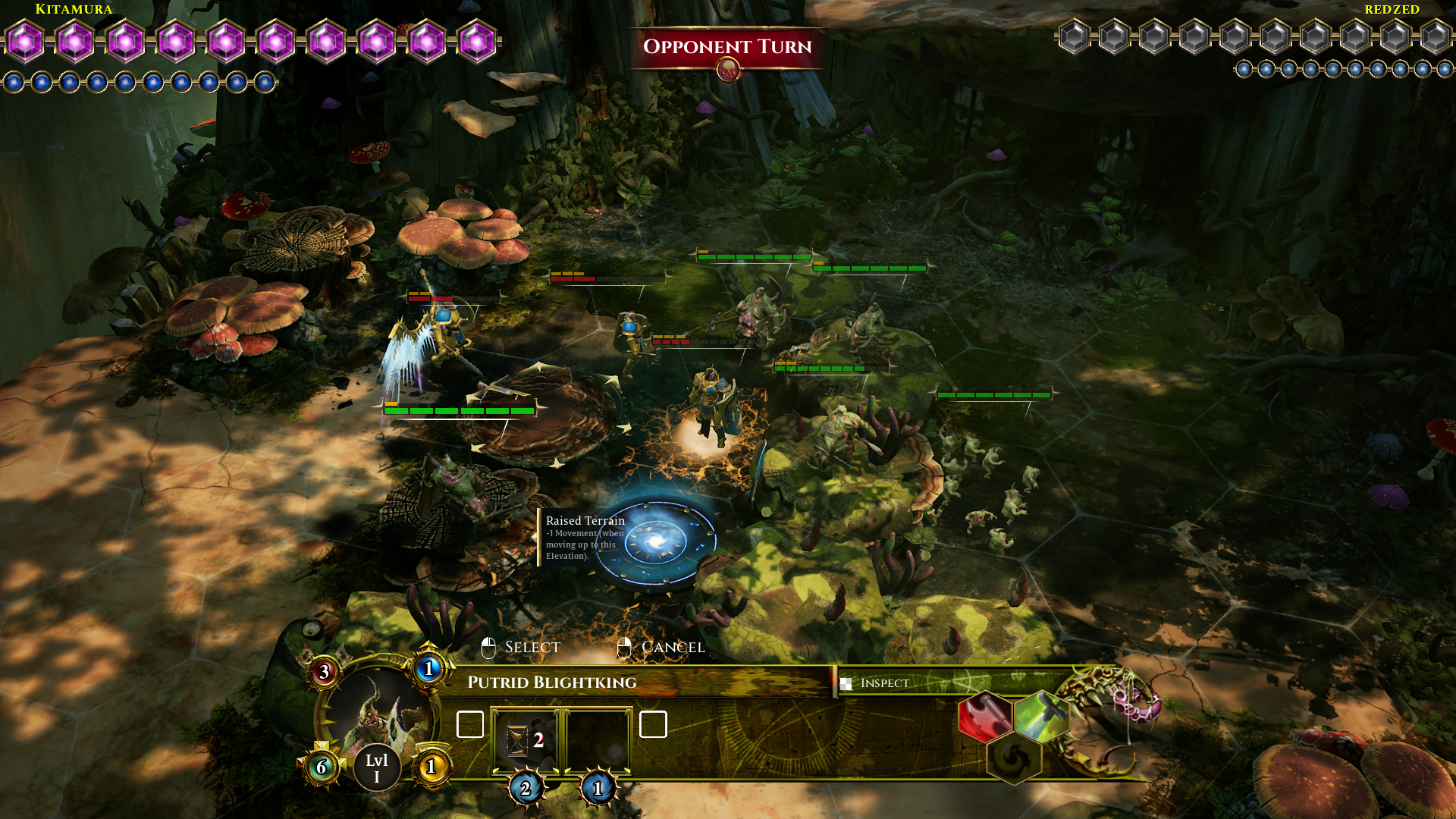
The longer a battle goes on, the more of the battlefield you cover in corruption, which makes for an interesting dynamic as your Nurglings scamper around shitting green goop while the enemy desperately gives chase, only to get reeled in by the gut-tongues of your tanky Putrid Blightkings or spewed upon by the airborne Blightlords. They're truly vile, and I love them.
Ahhh my sweet Maggotkin, where have you been all my life?
Beyond your regular melee and ranged combat, you can knock back and shove enemies around the battlefield, chaining damage in a similar way to the excellent kaiju-bashing classic Into the Breach. Knock a Nighthaunt Banshee into its allies, and if it dies it will explode on death, knocking enemies back even further and causing them to scatter in fear from its death screech.
But beyond these sporadic moments, the hex-based tactical combat is lightweight enough that it could have been the combat segment of a grander-scale strategy game (Warhammer 40,000: Gladius would really have benefitted from it).
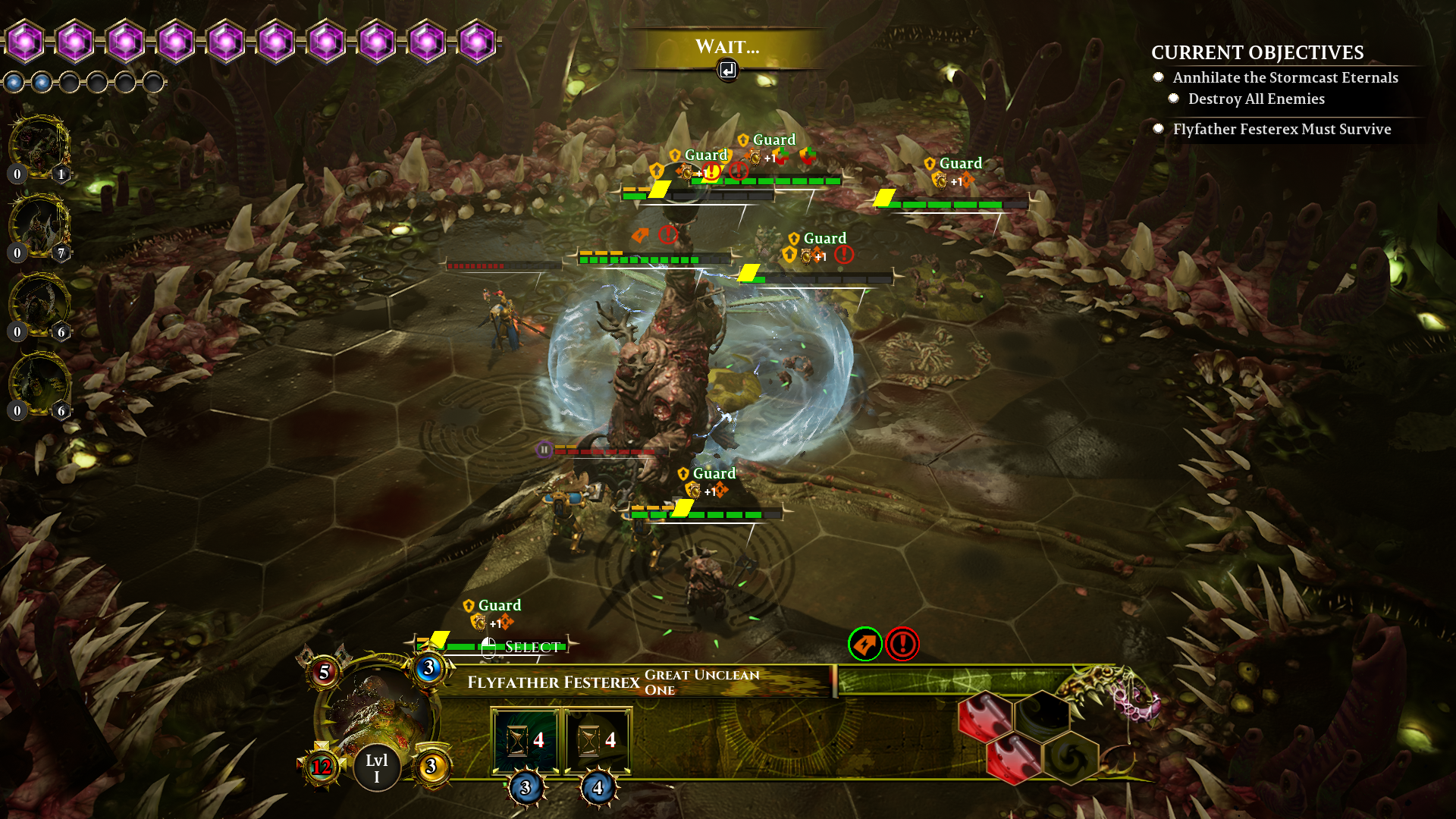
The maps are flat and scarce, with the only terrain advantages being single-level ledges of high ground to clamber up to. There's also the occasional hazard tile like a fissure or rickety walkway that can be shot out from under you, but it's pretty basic stuff. Strangely, prominent physical obstacles on the map offer no protection from ranged attacks, so be prepared to see arrows going straight through solid rocks and ruins.
All this is serviceable if unspectacular, but it gets buried beneath the campaigns' roguelike structure. Now, I'm a big fan of roguelikes, and will always be the first to defend the well-designed grind in the likes of Children of Morta or Dead Cells when they're accused of 'not respecting the player's time'. But in Storm Ground you can put in untold hours before a single wrong move unravels your entire campaign, and no amount of levelling, cards or new units you unlock for subsequent runs makes up for the drudgery of having to redo it all again with little variation.
It gets worse. Once you complete a chapter (that takes about three hours, not including hours worth of failed runs), you permanently unlock the second chapter in the campaign menu, which seems to suggest that you get to continue your hero's journey from this point at your leisure—a much-needed checkpoint on this longest of roguelike journeys.
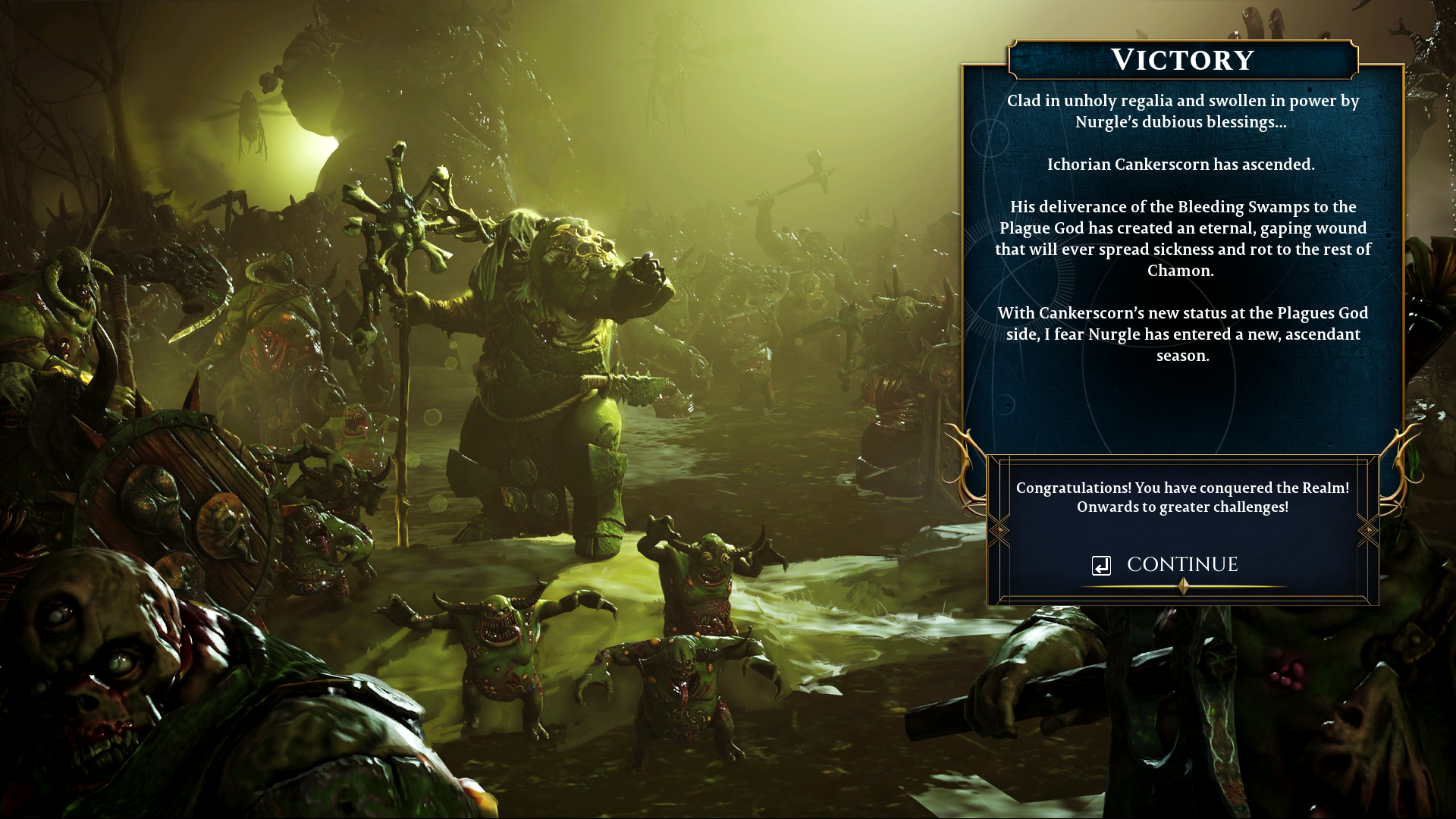
Instead, when you click to play the next chapter, you restart the entire campaign at a higher difficulty, and only after trudging through that for hours do you get to progress your campaign into the next chapter. Yes, your multi-hour run—with its finely tuned warband of units and skills—restarts not only when you die, but when you win the climactic battle at the end of a chapter.
Your multi-hour run restarts not only when you die, but when you win the climactic battle at the end of a chapter
I wanted to see through the Maggotkin campaign, but after some 25 hours across all three factions I'm tired of repeatedly running through the same battles and story beats, especially when I feel like I've earned the next step by completing an hours-long chapter without dying. It feels like a misuse of the roguelike format to pad out a game that—with three lengthy three-act campaigns—really didn't need it.
Presentational and quality-of-life problems don't help. In a game of such high stakes, it's perplexing that Storm Guard is missing basic conveniences like being able to undo a move at least once in a match, cancelling a delayed action (the button is there but doesn't seem to work), or even clear signalling of which units have and haven't had their turn yet.
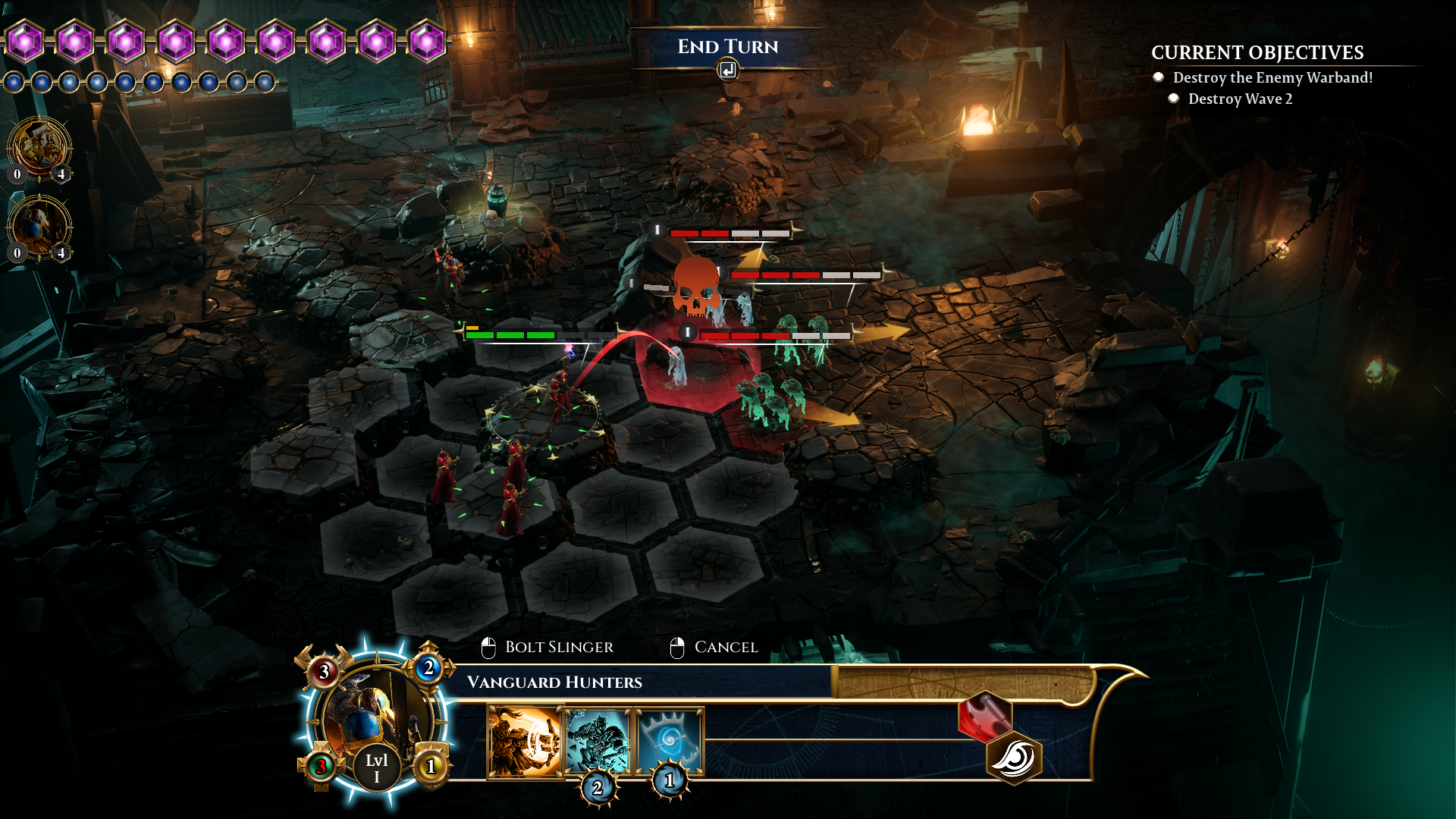
Units disappear upon death without animation, and at one point the last remaining enemy unit turned invisible. When I clicked 'Save and Exit' to see if it fixed the bug, there was no warning that the game doesn't save your progress mid-battle, which meant rewinding twenty minutes and repeating the battle. Another twenty minutes wasted.
The game's uncomplicated combat is easier to enjoy in the multiplayer where it's free of the roguelike burden. There's some fun to be had there, especially if it diversifies the tactical utility of the maps and adds more of Age of Sigmar's unique factions in future DLC.
I'm grateful to Storm Ground for introducing me to the Maggotkin, but I think I'll go off and research them online rather than keep wading through a game that misjudges what it is that makes roguelikes fun.
A straightforward tactics game buried beneath a impassable mountain of roguelike metagame.
Robert is a freelance writer and chronic game tinkerer who spends many hours modding games then not playing them, and hiding behind doors with a shotgun in Hunt: Showdown. Wishes to spend his dying moments on Earth scrolling through his games library on a TV-friendly frontend that unifies all PC game launchers.
